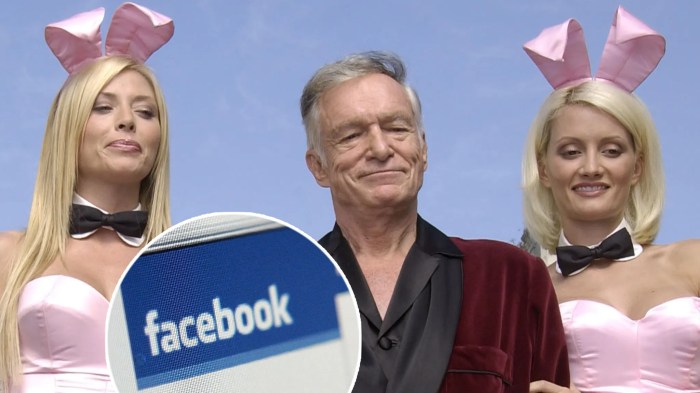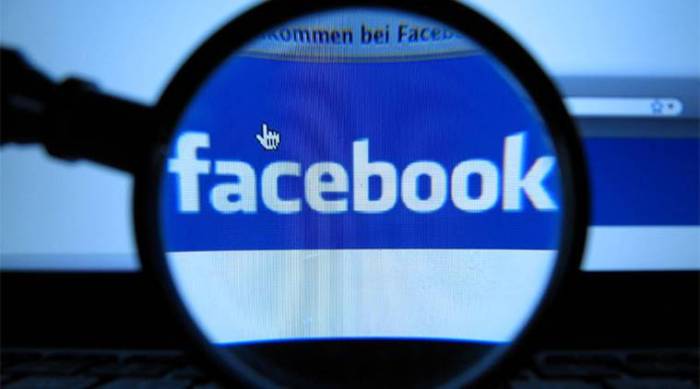Playboy joins the deleteFacebook movement—a bold move from a brand synonymous with pushing boundaries. This isn’t just another company ditching Facebook; it’s a statement about data privacy, brand identity, and the evolving digital landscape. How will this impact Playboy’s marketing strategy? Will its audience follow suit? And what does this mean for the future of social media engagement in the adult entertainment industry? Let’s dive in.
The decision by Playboy, a brand with a long and complex history intertwined with media and image-making, to participate in the deleteFacebook movement represents a significant shift in its social media strategy. This move necessitates a reevaluation of its audience engagement, marketing approaches, and competitive positioning within the adult entertainment and lifestyle sectors. The potential repercussions, both positive and negative, are substantial and warrant a closer examination.
Playboy’s Brand Image and Social Media Strategy: Playboy Joins The Deletefacebook Movement
Playboy’s journey through the digital landscape has been as complex and multifaceted as its iconic brand. From early forays into online publishing to navigating the ever-shifting tides of social media, the company has consistently sought to adapt its image to the changing times. Their recent participation in the “deleteFacebook” movement, however, presents a fascinating case study in brand identity and strategic repositioning.
Playboy’s historical relationship with social media platforms has been marked by both success and controversy. Initially embracing platforms like Facebook to expand its reach and engage with a younger audience, Playboy also faced challenges maintaining a consistent brand image across various channels. The platform’s algorithms and community guidelines sometimes clashed with Playboy’s provocative content, leading to censorship and frustration. This tension highlights the inherent complexities of balancing brand image with the realities of social media moderation.
Playboy’s Brand Identity and the “deleteFacebook” Movement
Playboy’s decision to participate in the “deleteFacebook” movement, while seemingly at odds with its need for broad online reach, aligns with a broader shift towards a more sophisticated and nuanced brand identity. The move can be interpreted as a calculated attempt to distance itself from the controversies surrounding Facebook’s data privacy practices and its perceived role in spreading misinformation. This resonates with a growing segment of consumers who prioritize ethical and responsible brand behavior. By aligning with this movement, Playboy implicitly positions itself as a brand that values user privacy and is willing to prioritize its values over immediate gains in social media engagement. This strategy, however, carries significant risk, as it could alienate a portion of its audience accustomed to interacting with the brand through Facebook.
Potential Impacts on Playboy’s Marketing and Audience Engagement
The impact of Playboy’s “deleteFacebook” decision on its marketing and audience engagement is difficult to predict with certainty. The immediate effect will likely be a decrease in reach and engagement metrics on Facebook. However, this loss might be offset by increased brand loyalty among consumers who appreciate Playboy’s stance. The long-term consequences depend on the success of Playboy’s strategy on alternative platforms. A successful transition to other platforms could lead to increased engagement with a more targeted and engaged audience. Conversely, failure to build a strong presence on alternative platforms could lead to decreased brand visibility and a loss of market share. The success of this strategy hinges on Playboy’s ability to adapt its content and messaging to the nuances of different platforms.
Hypothetical Social Media Strategy for Playboy Post-“deleteFacebook” Movement
A post-“deleteFacebook” social media strategy for Playboy should focus on diversification and strategic platform selection. Prioritizing platforms like Instagram, which allow for visually rich content aligned with Playboy’s aesthetic, is crucial. Utilizing platforms like Pinterest for curated content and potentially even TikTok for shorter, engaging video clips could also be beneficial. The key is to create tailored content for each platform, respecting its unique characteristics and user base. For example, Instagram could feature high-quality photography and behind-the-scenes glimpses, while TikTok could showcase short, playful videos. This multi-platform approach allows Playboy to reach a broader audience while maintaining brand consistency across different channels. Furthermore, investing in email marketing and direct-to-consumer strategies will help solidify relationships with loyal fans and cultivate new ones outside the confines of social media algorithms. This diversified strategy will help mitigate the risks associated with relying heavily on any single platform.
The “DeleteFacebook” Movement’s Context and Goals

Source: toofab.com
The “DeleteFacebook” movement, while not a formally organized entity, represents a widespread sentiment of disillusionment and distrust towards Facebook (now Meta). It’s a loosely connected collection of individuals and groups who’ve chosen to deactivate or delete their Facebook accounts, often driven by a shared set of concerns about the platform’s impact on privacy, societal well-being, and democratic processes. Its history is less a series of coordinated events and more a gradual swell of discontent culminating in periodic waves of account deletions.
The movement’s momentum has ebbed and flowed, often coinciding with major Facebook scandals and controversies. Initial concerns centered on privacy violations and data breaches, but the scope of criticism has broadened significantly.
Key Events and Motivations Driving the Movement
The “DeleteFacebook” movement isn’t tied to single, definitive events. Instead, it’s fueled by a continuous stream of criticisms and controversies surrounding Meta. Cambridge Analytica, the 2016 US Presidential election’s impact, and ongoing concerns about data collection and algorithmic manipulation have all contributed to the movement’s growth. Each instance eroded public trust, prompting many to reconsider their relationship with the platform. The consistent revelation of Facebook’s internal knowledge of harmful content, coupled with their seemingly slow response to address it, further fueled the exodus. The feeling of being manipulated by algorithms designed to maximize engagement, often at the expense of well-being, also plays a significant role.
Criticisms Leveled Against Facebook (Meta)
The criticisms against Facebook are multifaceted and interconnected. They broadly fall under concerns about data privacy, misinformation and harmful content, the addictive nature of the platform, political manipulation, and the erosion of genuine human connection. Specific examples include the Cambridge Analytica scandal, which exposed the misuse of user data for political advertising; the spread of misinformation and conspiracy theories, which have been linked to real-world harm; and the documented impact of Facebook’s algorithms on mental health and well-being. The platform’s power and influence on global politics, and its role in facilitating the spread of propaganda and hate speech, are also major points of contention.
Arguments For and Against Leaving Facebook
The decision to leave Facebook is a personal one, weighed against various considerations. The following table summarizes the main arguments:
| Arguments for Leaving Facebook | Arguments Against Leaving Facebook |
|---|---|
| Increased Privacy and Data Security: Reduced exposure to data harvesting and potential misuse. | Loss of Connectivity: Difficulty in staying in touch with friends, family, and colleagues. |
| Improved Mental Well-being: Reduced exposure to negativity, comparison, and addictive design features. | Missed Opportunities: Potential for missing out on events, announcements, and community discussions. |
| Reduced Exposure to Misinformation and Harmful Content: Less exposure to fake news, hate speech, and potentially harmful content. | Professional Networking: Reduced access to professional networking opportunities and career advancement. |
| Greater Control Over Personal Information: More control over what information is shared and with whom. | Maintaining Social Status: The perception of being “out of the loop” or “unconnected.” |
Playboy’s Audience and Their Response

Source: indianexpress.com
Playboy ditching Facebook? Big news, right? It’s a whole different vibe from the corporate shake-up at Lytro, where, as reported in this article, lytro shutting down employees moving to google , creating a tech talent scramble. But back to Playboy – their move shows a growing distrust of big tech, mirroring a similar sentiment driving the #DeleteFacebook movement.
Playboy’s decision to join the #DeleteFacebook movement is a bold one, potentially impacting its relationship with a diverse and evolving audience. Understanding this audience and predicting their reactions requires a nuanced look at their demographics, digital habits, and overall brand perception of Playboy. The success or failure of this move hinges on how effectively Playboy communicates its rationale and aligns it with the values its audience holds dear.
Playboy’s audience is traditionally associated with a male demographic, ranging in age from young adults to older millennials, with a strong interest in lifestyle, entertainment, and, of course, sexuality. However, the brand has actively worked to broaden its appeal in recent years, incorporating more inclusive perspectives and content, attracting a more diverse readership, including women and individuals across a wider spectrum of sexual orientations and identities. This shift makes predicting a monolithic audience response impossible; instead, a range of reactions is likely.
Audience Demographic Breakdown and Potential Reactions, Playboy joins the deletefacebook movement
The core audience, long associated with a certain archetype of masculinity, might exhibit mixed reactions. Some might applaud Playboy’s stand against Facebook’s perceived data privacy issues and monopolistic practices, viewing it as a bold and principled move aligning with their own values. Others, particularly those less concerned with digital privacy or more resistant to change, might perceive it as an unnecessary gesture, potentially impacting their engagement with the brand. Younger demographics, more accustomed to digital activism and alternative social media platforms, might be more receptive, seeing it as a natural progression for a brand attempting to remain relevant in a rapidly evolving media landscape. Women and LGBTQ+ individuals, increasingly significant parts of Playboy’s expanded audience, may view the move favorably, aligning with a broader trend of critical engagement with large tech corporations and their impact on society.
Similar Brand Decisions and Public Perception
Several brands have taken similar stances on social media issues in the past, with varying results. Patagonia’s consistent activism on environmental issues, for instance, has strengthened its brand image among environmentally conscious consumers, while potentially alienating others. Conversely, brands that have remained silent or been perceived as overly commercial have faced backlash from consumers increasingly demanding ethical and socially responsible behavior from the companies they support. The success of such initiatives hinges on the authenticity of the brand’s commitment and the clarity of its messaging. Playboy’s history of pushing boundaries might lend credibility to this move, but a poorly executed campaign could backfire.
Impact on Audience Loyalty and Brand Perception
Playboy’s decision could enhance its brand image among a segment of its audience who value privacy, ethical business practices, and social responsibility. This could lead to increased loyalty and positive word-of-mouth marketing. However, alienating a portion of its traditional audience is a possibility. The ultimate impact will depend on how effectively Playboy manages communication surrounding the decision, addressing concerns and maintaining a consistent brand voice across all platforms. A well-executed campaign, emphasizing the reasons behind the move and highlighting alternative engagement methods, could mitigate potential negative consequences. Conversely, a poorly handled campaign could lead to a decline in engagement and a negative shift in brand perception, especially among those who feel the move was disruptive or unnecessary.
Long-Term Effects and Future Trends

Source: grid.id
Playboy’s decision to join the #DeleteFacebook movement carries significant long-term implications, forcing a reassessment of its digital strategy and potentially impacting its bottom line. The move, while bold, necessitates a careful navigation of the evolving social media landscape to maintain brand relevance and audience engagement. This requires understanding the potential consequences and adapting to future trends.
The potential long-term consequences for Playboy’s business model are multifaceted. A decreased reliance on Facebook’s advertising and organic reach could impact brand awareness and customer acquisition. However, it also presents an opportunity to build a more direct relationship with its audience, fostering loyalty and potentially increasing revenue through alternative platforms. The success of this transition will depend on Playboy’s ability to effectively leverage alternative channels and engage its target demographic.
Impact on Playboy’s Business Model
Playboy’s business model traditionally relied heavily on broad social media reach for marketing and brand building. By distancing itself from Facebook, the company faces potential challenges in maintaining its current level of engagement and audience growth. However, this also presents opportunities to explore more diverse and potentially more effective strategies. For example, focusing on building a stronger presence on platforms like Instagram, TikTok, and even emerging platforms could lead to more targeted marketing campaigns and a deeper connection with loyal followers. The long-term success hinges on the company’s ability to cultivate these new channels and develop content that resonates with its audience on those specific platforms.
Adaptation Strategies from Other Companies
Several companies have successfully adapted to shifting social media landscapes. For instance, Patagonia shifted its focus to Instagram, showcasing stunning visuals of its products in their natural environment, fostering a strong brand identity aligned with its values. This strategy resonated deeply with its environmentally conscious target market. Similarly, brands like Dove have leveraged TikTok’s short-form video format to create engaging content that connects with younger audiences, moving away from traditional advertising methods. These examples highlight the importance of adapting strategies to suit the unique strengths of each platform.
Future Social Media Trends and Their Impact
The future of social media points towards increased personalization, a rise in privacy-focused platforms, and a growing emphasis on community-driven content. Playboy could capitalize on this by investing in personalized marketing campaigns, focusing on creating interactive content that fosters community engagement, and exploring platforms that prioritize user privacy. The metaverse also presents a unique opportunity for Playboy to create immersive experiences for its audience, further strengthening brand loyalty and interaction.
Visual Representation of Playboy’s Evolving Social Media Presence
Imagine a visual representation: A three-panel graphic. The first panel depicts a crowded, cluttered Facebook page with numerous posts, showcasing a diluted brand message. The second panel shows a more streamlined, visually appealing presence across multiple platforms – Instagram showcasing high-quality photography, TikTok featuring engaging short videos, and a dedicated website featuring exclusive content and interactive forums. The third panel depicts a vibrant, interactive metaverse experience, with avatars interacting in a Playboy-themed virtual world. This evolution represents a shift from broad reach to focused engagement and a stronger emphasis on direct interaction with the audience across a diversified portfolio of digital platforms.
Epilogue
Playboy’s participation in the deleteFacebook movement is more than a simple platform switch; it’s a calculated risk with potentially far-reaching consequences. The success of this strategy hinges on how effectively Playboy navigates the shifting sands of social media, adapts to new platforms, and maintains its connection with its audience. Only time will tell if this bold move solidifies its brand image or leads to unforeseen challenges. The future of brand-audience interaction in the digital age is certainly worth watching.